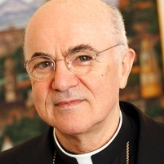Officials
Back to Officials
Back to Vatican City


Offical

Name: Vigano, Carlo Maria
Current Position: Ambassador
On October 19, 2011, Carlo Maria Viganò took over as ambassador to the United States from the city-state of Vatican City (Holy See). A Vatican financial reformer who apparently did not want the job, Viganò, who is an archbishop in the Roman Catholic Church, was lobbying for the job of President of the Governorate of Vatican City State, which is the highest legislative and administrative position in Vatican City, and wrote letters to Pope Benedict XVI stating his strong preference for remaining in Italy. According to published reports, his ambition was thwarted by an alliance of doctrinal conservatives and Vatican officials offended by his sometimes aggressive style.
He officially holds the title of Apostolic Nuncio, an office which has both the secular responsibilities of an ambassador and ecclesiastical duties related to the administration of Catholic Church affairs in the United States, especially relating to the appointment of new bishops. Viganò is the fourteenth papal representative to the United States since the creation the post in 1893, and the fifth to serve as a diplomatic representative since the U.S. and Vatican City established diplomatic relations in 1984.
Born January 16, 1941, in Varese, Italy, Viganò was ordained a priest on March 24, 1968, and earned a doctorate in canon and civil law. He entered the Vatican’s diplomatic service in 1973, and served early overseas assignments in Iraq and Great Britain. From 1978 to 1989, Viganò served at the Vatican Secretariat of State. From April 1989 to April 1992, he was Special Envoy and Permanent Observer to the Council of Europe in Strasbourg, France.
On April 3, 1992, Pope John Paul II appointed Viganò Titular Archbishop of Ulpiana, an ancient Roman city in Kosovo that is now an archaeological site, and Apostolic Nuncio to Nigeria. Viganò was consecrated a bishop on April 24 of that year. While he was serving in Nigeria, Pope John Paul II visited the country in 1997.
Upon returning from Nigeria in April 1998, Viganò was again assigned to the Secretariat of State, where he served until July 2009. In 1999, he led a five-man Vatican delegation to Iraq to try to make arrangements for a proposed visit by Pope John Paul, who had wanted to go to Ur, the city thought to be the birthplace of Abraham. However, the Western economic embargo of Iraq and the no-fly zone being enforced by the US and British militaries prevented the trip. On July 16, 2009, Viganò became Secretary General of the Vatican Governorate, the Vatican’s second highest administrative position. As Secretary General, at the General Assembly of Interpol in November 2010, Viganò critiqued the modern world economy, saying that “while it is true that globalization offers opportunities for development and enrichment, it is also true that it can cause increased poverty and hunger, which in turn can spark chain reactions often leading to widely disparate forms of violence.”
On August 13, 2011, the Vatican Secretary of State informed Viganò that, despite Viganò’s wishes to the contrary, Pope Benedict wished to appoint him Nuncio to Washington, to which Viganò submitted.
In addition to his native Italian, Viganò also speaks French, Spanish, and English.
Viganò will be Nuncio to the U.S. (by Marco Tosatti, La Stampa)
New Nuncio is No Stranger to Politics (by John L. Allen, Jr., National Catholic Reporter)
- Latest News
- D.C. Public Schools will Teach all Second-Graders to Ride a Bike
- New Rule in Germany Limits Sales of Sex-Themed E-Books to 10pm to 6am
- What Happened to the 6-Year-Old Tibetan Boy the Chinese Government Kidnapped 20 Years Ago?
- U.S. Ambassador to Turkey Photoshops his Hair Color to Mock Turkish Mayor
- Mystery Artist Calls Attention to Unfixed Potholes by Drawing Penises around Them





